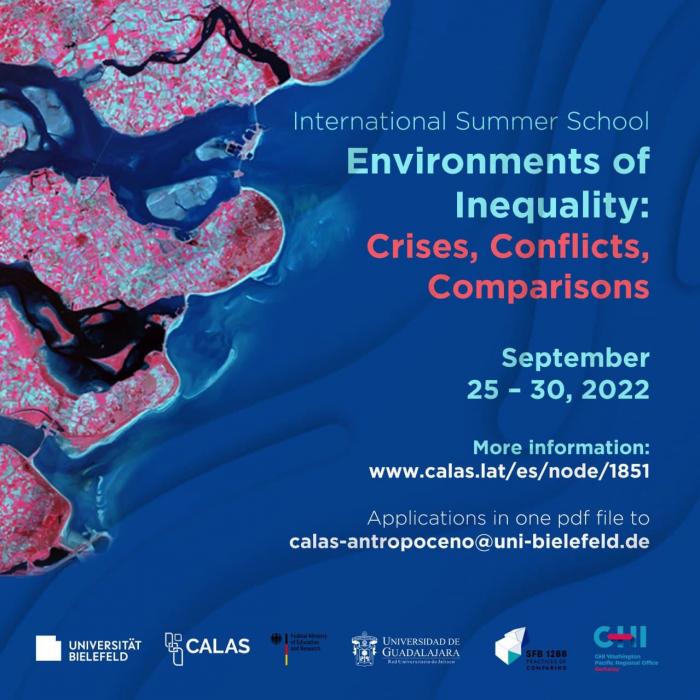The Maria Sibylla Merian Center for Advanced Latin American Studies in the Humanities and Social Sciences (CALAS), the Pacific Regional Office of the German Historical Institute Washington (GHI PRO) at UC Berkeley, and the Collaborative Research Center (SFB) 1288 “Practices of Comparing” at Bielefeld University invite doctoral students with an interest in history from any field, literary studies, geographies, environmental humanities, sociology, political science, anthropology, ethnic studies, economics, or legal studies, to apply to attend an international summer school that will be convened from September 25 to 30, 2022, at CALAS (Guadalajara, Mexico) on the theme of Environments of Inequality: Crises, Conflicts, Comparisons.
Rationale
Unequal access to power, natural resources, or welfare have always characterized the Americas. Some of these inequalities go back to the “discovery” of North and South America and the ensuing power of coloniality. Other inequalities are based on gender, race, social class, age, or legal status; often more than one of these categories is at work. Frequently, these inequalities are related to or inscribed not only in the social space of human interactions but also in the physical environments. Extractivism and use of resources, risks of pollution and disasters, patterns of consumption and ecological footprints, and different concepts of “nature” reveal the multiple articulations of social inequalities and “natural” environments.
The summer school Environments of Inequality, thus, will examine topics related to different formations and expressions of environments of inequality from the early modern, colonial period to the present age of the Anthropocene with a strong (but not exclusive) focus on the Americas from multiple interdisciplinary perspectives.
The summer school will be divided into three interconnected streams that address crises, conflicts, and comparisons across time and space. These different thematic blocs will be facilitated by experts in the respective fields and include short lectures as well as discussions of assigned theoretical and empirical readings. Participants will have the opportunity to present and discuss their own work. We are particularly interested in exploring the following sets of questions, which might well overlap empirically:
1. Crises: In this first stream, we will focus on historical circumstances in which social routines become disrupted and social actors identify a crisis. We will explore the kinds of social actors – social movements, media, cultural producers, millennial religious movements, etc. – that begin to speak of a crisis. Ultimately, geologists and earth scientists have emphasized the idea that a profound crisis in earth systems led to the invention of a new historical age, the Anthropocene. But also in previous historical periods we find multiple actors that have advanced the notion of crisis concerning environments of inequality, ranging from the Andean-indigenous concept of pachakutik (crisis and renewal) to the critique of racist environments as expressed in Caribbean risk-escapes from New Orleans to Haiti.
2. Conflicts: In the second stream, we will focus on proactive forms of organization and protest that communities and movements have developed to address environments of inequality. For example, we wish to discuss, in particular, how environments of inequality can be studied in situations of uncertainty and conflict, but also how crises and conflicts can open new opportunities to challenge or reinforce existing inequalities. Such situations may include the revolutions in the Greater Caribbean, the “second slavery,” challenging state-building processes, contemporary environmental crises and natural disasters, or the current Covid crisis in Latin America.
3. Comparisons: In the third stream, we will introduce the perspective of comparisons in two ways. First, we will approach the abovementioned themes from a comparative angle and discuss how different countries and regions in the Americas, in particular, but also in other world regions deal with similar crises and conflicts, and how these situations may increase or overcome inequalities. Here we will aim to discuss new comparative approaches. Second, we will introduce the methodological approach of studying “practices of comparing.” This approach focuses on the question of what actors do when they make comparisons and how practices of comparing used by historical and contemporary actors reveal, create, or may overcome social, economic, gender, or environmental inequalities. This will be done beyond the scope of the Americas.
Application and Procedure
Travel, accommodation, and meals for the participants will be fully covered. The program targets doctoral students engaging in projects related to the aforementioned themes and questions, particularly from a comparative perspective. The discussion will take place in various formats, including project presentations, thematic workshops, scholars in conversation, and keynote lectures. The working language is English. The application should likewise be in English and consist of:
- a curriculum vitae (2 pages max.);- an outline of the current project (600 words);
- a brief motivation letter that describes the relevance of one’s own research to the summer school’s topic;
- two relevant suggested readings (please provide bibliographical data only, no copies of the suggested readings)
- the names of two university faculty members who can serve as referees (no letters of recommendation required).
Deadline: September 30, 2021.
Send your application by e-mail as a single pdf file to Ann-Kathrin Volmer: calas-antropoceno@uni-bielefeld.de
Applicants will be notified whether they have been selected in December 2021. Successful applicants will be asked to submit the draft of a research paper or draft chapter of their PhD (6,000 words max.) to be discussed at the event.
Organizing Committee: Cornelia Aust (Bielefeld University, SFB 1288), Sarah Beringer (GHI Washington), Olaf Kaltmeier (CALAS), Albert Manke (GHI PRO Berkeley), Mario Peters (GHI Washington), Ann-Kathrin Volmer (CALAS)
For further information contact
Cornelia Aust: cornelia.aust@uni-bielefeld.de
Ann-Kathrin Volmer: calas-antropoceno@uni-bielefeld.de
Mario Peters: peters@ghi-dc.org


